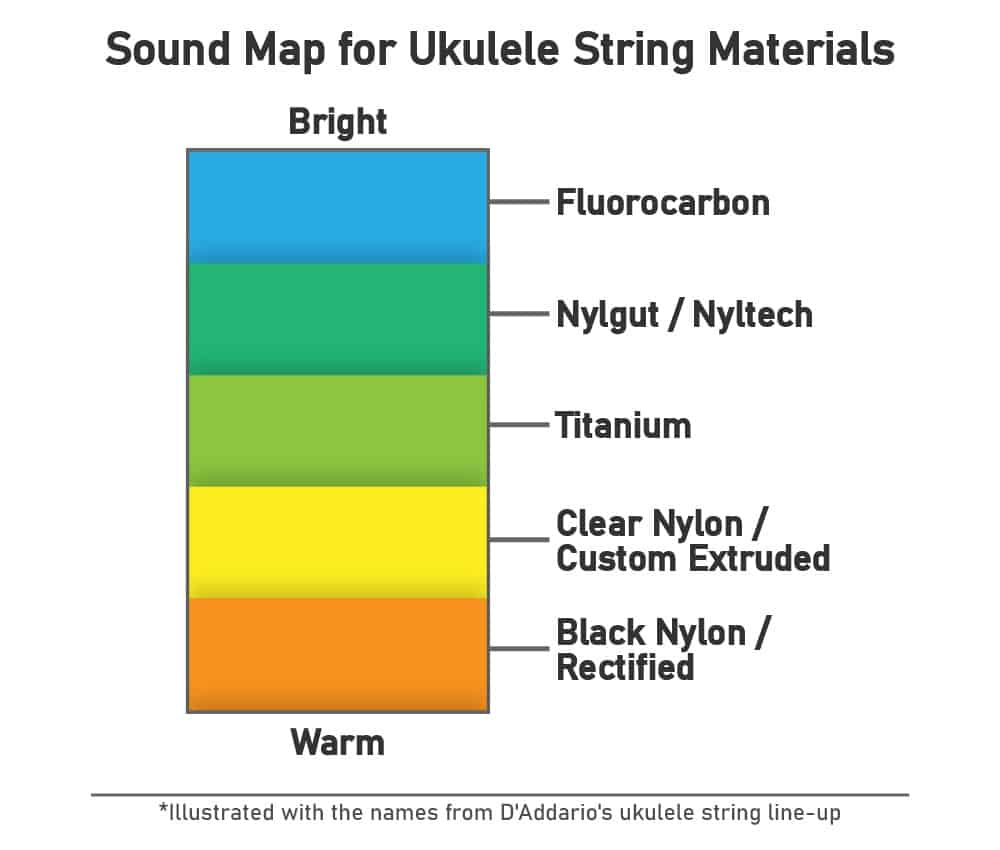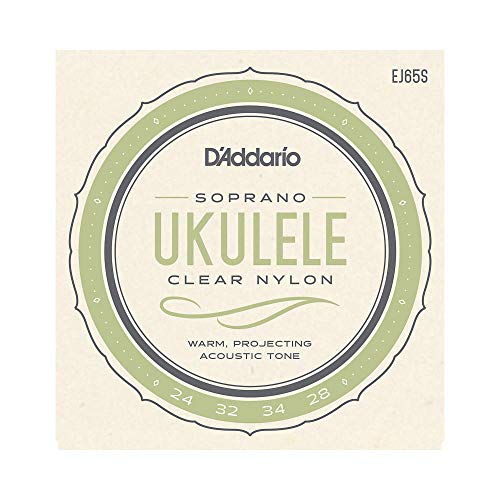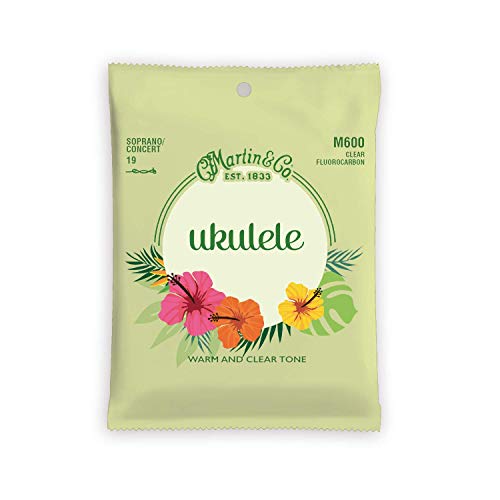Today I’m going to explain exactly what materials are used to make ukulele strings.
I personally play with strings made of Nylgut, and below you’ll learn why it’s the most popular type of ukulele strings for many uke players.
I’ll also cover the other 5 types of ukulele strings, and if/when you might want to use them instead.
Let’s jump right into it!
What Ukulele Strings are Made Of
Nearly all ukulele strings are made from synthetic nylon or fluorocarbon materials. Within these broad categories, there are several sub-categories, including nylgut, synthetic “titanium” strings and wound strings.
Each material has a slightly different tone and character, which makes them better for certain sounds and styles of music. Here’s a quick chart that summarizes the sound of each different type of string material:

Let’s dig deeper into the 6 most common types of Ukulele strings, starting with Nylgut, which is the most common type of strings for beginners.
1. Nylgut / Nyltech
Nylgut (also called Nyltech) strings are made of a Nylon compound that is a bit different than other Nylon strings available on the market. Nylgut strings are easy to identify because the strings are visibly white, whereas most other Ukulele strings are either clear, or tinted with some other color.
Nylgut strings were originally designed to mimic the tone found in traditional Ukulele instruments, which were built with animal intestines (I know, it’s gross, but true).
Affordable ukuleles typically come with Nylgut strings, perhaps because they have a knack for making cheaper instruments sound better, which is why it’s the most popular type of string for beginners and those who are trying to save a few bucks.
It’s also worth mentioning that the Nylgut material holds a tune much longer than standard Nylon strings, and the sound is also brighter (whereas Nylon strings have a warmer tone).
I’ve already made several comparisons with Nylon strings, so let’s jump to those next.
2. Nylon
Nylon strings are made of nylon (no surprises here!), but the string manufacturers may not always label them so obviously. For example, D’Addario also calls their Nylon strings “Custom Extruded” and “Rectified”. All of these are Nylon strings.
In appearance, standard nylon strings (i.e. like Custom Extruded) are a cloudy/clear color. Kind of in-between the color of Nylgut and clear fluorocarbon strings. However, you can also find black nylon strings (i.e. like Rectified) which have an even warmer tone than standard nylon.
Nylon strings are a bit notorious, because they are TERRIBLE at holding a tune. If you choose nylon strings, you should be prepared to tune them frequently (like before each play), especially when you first get a new set.
However, if you love for your Ukulele to sound super warm and mellow, then nylon is the warmest sounding type of strings you can buy.
3. Fluorocarbon
Fluorocarbon is another popular material used for making Ukulele strings. Fluorocarbon is probably most commonly recognized as the material used to make fishing lines.
So, if you imagine a thin and transparent fishing line, what you’ll get in a set of fluorocarbon ukulele strings is similar.
Fluorocarbon strings are the “brightest” sounding of any modern ukulele strings. And because of this brightness, they tend to make more expensive and well-built ukuleles sound incredible.
That’s why fluorocarbon strings are often used by professional ukulele players (and those who can afford high-end instruments), instead of the Nylgut strings that are common on entry-level ukuleles.
4. “Titanium”
Titanium ukulele strings are not made of titanium. This terminology is basically just marketing lingo from the string manufacturer. Titanium strings are actually made of a nylon monofilament, which sounds “brighter” than your typical (very warm sounding) nylon strings.
It’s marketed as basically a middle-ground option, between the high “brightness” of fluorocarbon and the high “warmness” of nylon strings.
Titanium strings also look interesting, because they are a clear/purple color, which I don’t believe is the case for any other type of ukulele string (or any other stringed instrument for that matter).
These first 4 materials we’ve just covered, represent the bulk of all ukulele strings you’re likely to run into. However, there are a couple of more rare materials you might see in the music shop, which we’ll cover next.
5. Wound Nylon
Wound nylon strings have a nylon core which is wrapped in a winding layer of thin polymer string.
In other words, a wound nylon string is made of two materials:
- A nylon core
- A polymer wrap
By winding a string in this fashion, the manufacturers are able to make the strings sound much brighter than a standard nylon string.
If you’re familiar with the wound strings on a guitar (typically the few largest strings), these ukulele strings are similar, but use a nylon core, instead of a steel core.
Since this manufacturing technique is similar to what is done on guitar strings, you may also find that wound ukulele strings sound more like guitar strings (compared with other ukulele strings). You’ll also find that this type of string is typically only available on the largest types of ukuleles like a Tenor or Baritone.
6. Wound Metal
Wound metal strings are very similar to wound nylon ukulele strings, except for they typically use a steel core and a wrapping metal, like copper or aluminum.
This is extremely similar to guitar strings, and the similarity in the sound is quite noticeable.
Using wound strings is pretty rare for Ukulele players, and using wound metal strings is probably even more rare.
If you play the ukulele, but you want to make it sound like a guitar, this is easily the best way to do it.
Are Ukulele Strings Plastic?
This is a very common question, so let me give you my quick summary:
Ukulele strings are primarily made of plastic. More specifically, ukulele strings are made of fluorocarbon and a variety of nylon materials, all of which are forms of plastic. Metal ukulele strings do also exist, but they are extremely rare.
We’ve covered all of these materials above, but if you’re like me, you may not have known that nylon and fluorocarbon are both plastics. They are. And now we both know that 🙂
Can Ukuleles Use Metal Strings?
Installing metal strings on a ukulele could seriously damage it, because most ukuleles are only built to handle plastic strings. Metal strings apply much more tension to the neck of the instrument than plastic strings do, and many ukuleles simply won’t be able to handle it without bending or breaking.
With that said, there are metal strings designed to be used for large baritone or tenor ukuleles. In that case, yes, a ukulele can be used with metal strings.
However, if you have a typical concert or soprano ukulele (which are both smaller and more popular sizes), then you should think twice before trying to install metal strings. And you definitely shouldn’t try to install metal guitar strings.
In addition to being larger and built differently, guitars have truss rods built into them. Truss rods are rods that run through the middle of the neck, which help to secure the instrument against the tension of the steel strings.
Ukuleles typically aren’t going to have these truss rods, which is another reason why you probably shouldn’t try installing metal strings on your uke.



